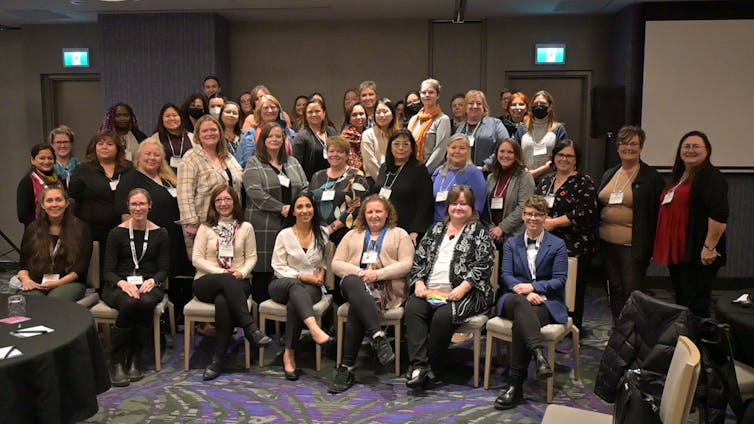
While the world went into lockdown at the onset of the COVID-19 global pandemic, shelters helping women who are survivors of domestic violence remained open.
In fact, for many of shelters, the work increased as they adjusted to public health measures and a surge in gender-based violence.
The United Nations has termed this a “shadow pandemic.”
À lire aussi : The COVID-19 pandemic has made the impacts of gender-based violence worse
Challenges facing front-line workers
I’ve been working in gender-based violence for 15 years, the past five at Women’s Shelters Canada, a national non-profit organization supporting women’s shelters.
My work in the field started early for me. As a survivor of gender-based violence, I know the reality all too well and have witnessed family members struggle to survive and carve out new paths to live free of violence and abuse. These early experiences propelled me into activism and the women’s movement.
As a researcher, I do not work directly with survivors, but rather those who work tirelessly to support them in their healing journeys.
Working at Women’s Shelters Canada has connected me with front-line workers across the country. Hearing their stories of struggle under the weight of the pandemic led us to conduct a national study about the extent of this labour crisis, as well as providing potential solutions on how we can collectively improve the lives of those who work so hard to make the world a better and safer place.

Retention problems
Like other sectors, especially the non-profit sector, we struggle with retention issues — losing workers to employers (usually government) that can offer better salaries and benefits.
I cannot count the times I have heard leaders in our sector refer to violence against women shelters as a “training ground.” We prepare our workers with all the tools they need to provide quality trauma-informed care to then watch them leave once they have gained enough experience.
But can we blame them? We know our salaries have not remained competitive and this is largely due to government funders refusing to increase salaries, even cost-of-living increases, in our operating budgets.
To compensate for this inadequacy, management tries workarounds like increasing benefits and flex time, but it’s not enough.
In a preliminary and unpublished subset of data from a recent national survey, we found that 32 per cent of shelter workers work an additional job to supplement their incomes, and over a quarter are considering quitting their jobs.
Compounding low wages is the level of burnout, vicarious trauma and compassion fatigue at all levels, from front-line workers to organizational leaders.
This occurs for many reasons, including working within broken systems (for example, the lack of affordable housing, inadequate mental health supports, insufficient social assistance and immigration barriers, to name just a few issues). As well, the complexity of cases have intensified during the pandemic, including both the severity and frequency of the violence survivors are experiencing.
À lire aussi : Canada's shadow pandemic: Femicide
Relentless need
As workers leave the sector and shelters struggle to hire new staff, the remaining workers are overwhelmed and exhausted from the past two and a half years.
Like the ongoing crisis of overflowing intensive care units in children’s hospitals, the demand and need is relentless.
Shelter Voices reported 60 per cent of women’s shelters have requested more space since March 2020.
This stress is spilling into workplaces as front-line workers have reported cases of microaggressions from other staff.

Half of workers we surveyed during the pandemic have witnessed or experienced microaggressions based on their race and 30 per cent based on gender identity. As a result of these compounding challenges, 64 per cent of shelters reported that they have seen a decrease in mental health of their front-line staff.
Leadership and management are doing their best to support workers, but are also affected by the increased workloads and challenges as the pandemic wears on. Shelters are an essential service for many survivors of domestic violence, and yet they must raise funds to keep their doors open and services flowing.
We’ve heard from our members that some provinces are seeing a turnover in leadership of up to 25 per cent. The loss of this institutional knowledge at the organizational and sector level is profound and will have lasting impacts.
Coming together to build a movement
We recently brought together 45 shelter workers from across the country to discuss this issue. The participants were grateful, after more than two years of isolation, for an opportunity connect with their peers.
We could feel the energy and the momentum to create some real change to improve the lives of workers. We asked some hard and critical questions of each other: Are we a sector or are we a movement?
We are both, and transformation — especially when it comes to the large systemic change required to end gender-based violence — needs diverse and multi-layered strategies.
We need to take to the streets to demand equitable and sustainable funding that similar sectors receive. We believe that the supports a survivor receives should not depend upon their postal code. There are fewer services in rural, remote and northern communities and what services do exist must act as a catch-all for a variety of community needs.
We also need a seat at the table with the federal government as it shapes its National Action Plan on Gender-Based Violence.

In a workforce predominantly comprised of women and women of colour, we are tired of being ignored, silenced and tokenized.
Our expertise and value is essential in the fight to end gender-based violence. Our workers are the heart of this transformative justice work and need to be recognized, appreciated and adequately compensated for the important and often life-saving work they do.
Survivors — and frontline workers — deserve nothing less.
Krys Maki (they/them) worked for Women's Shelters Canada as the Director of Research and Policy from 2017-2022.
This article was originally published on The Conversation. Read the original article.







